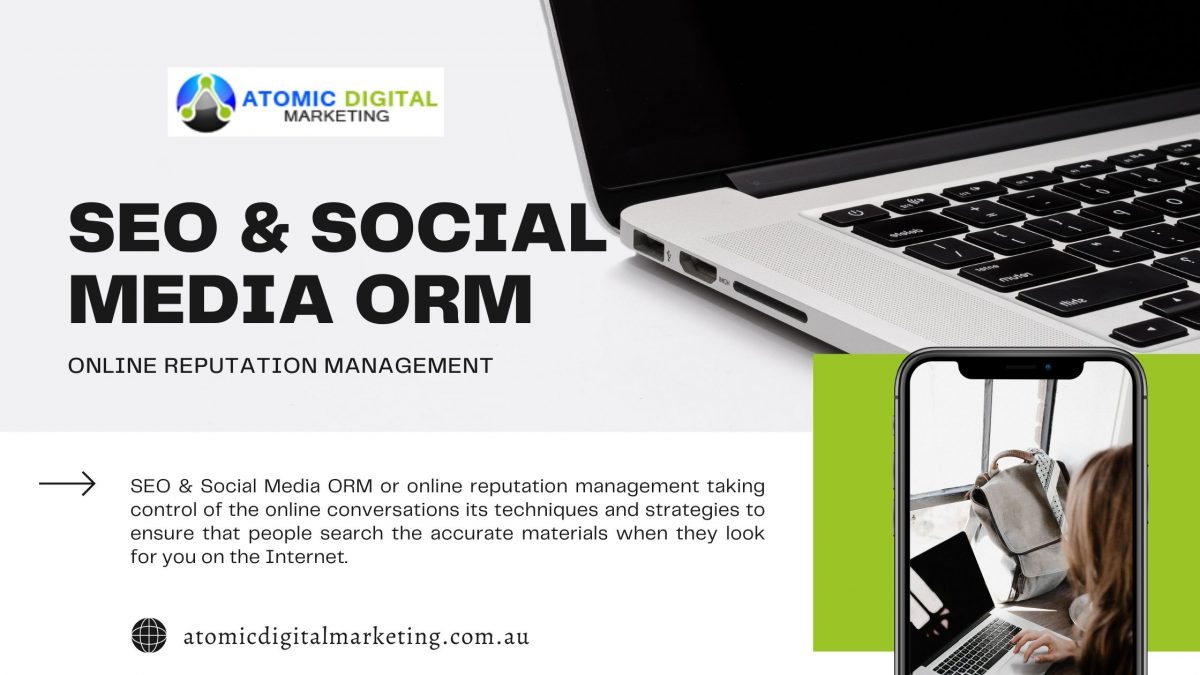SEO & Social Media ORM
SEO & Social Media ORM or online reputation management taking control of the online conversations its techniques and strategies to ensure that people search the accurate materials when they look for you on the Internet.
SEO Reputation Management focuses on SERP (search engine results page) and keyword performance. It is about searching for opportunities to improve rankings of positive content and drown out negative search results.
Social Media Reputation Management monitoring social media channels (Facebook, Twitter, Instagram, etc.) and engaging with consumers on those channels who talk about your business or brand and a goal for your reputation management is to, positively shape the consumer perception of your brand or business.
Here’s more about some of the SEO & Social Media ORM tactics we commend to our clients.
Why SEO reputation management matters – with so much hinging on the success of your online reputation, it’s no surprise that, according to Forbes, 97% of business owners say ORM is vital to their marketing strategy. Here is a deeper dive strategies for online reputation management to your business:
Boost Prominence of Positive Search Rankings
You want consumers to focus on the good things, not the bad. While you can’t just call Google and ask them to get rid of negative information about your site, you can boost positive results to make those negative results less visible. You can use SEO techniques—more on how in a minute—to ensure positive content about your site drowns out any negative reviews.
You can also ask satisfied customers to leave reviews that there is always a steady stream of positive insight into your products and services. Not only do these reviews show up in search results, but they also give potential customers the confidence to buy and trust your products and services. Used Automated Tools that can help you gather feedback, it can see what’s working and make changes to things that are not.
Address Negative Search Results
Google search page lists the top 10 results for any search term. If you want to remove negative results from the first page, you will need to rank nine other pieces of content ahead of it. This can take time and a lot of energy, but the payoff is worth it.
SEO tools are key when you want to push negative results farther down the queue. Start by identifying which keywords are affected by using a tool like Ahrefs or similar. Once you know which search terms are producing negative results, you can target your SEO efforts on those terms.
Investing in link building can help boost the trust factor of your site, which is a key factor Google uses when ranking content. For some business owners, SEO may require more time or effort than they can give. If that’s your case, think about hiring an SEO agency to help out.
Fine-tune Content All Platforms
To move the focus from negative results to positive reviews, you’ll need to address content on all platforms. That includes everything from social media sites like LinkedIn, Instagram, and Twitter to online review sites including Google, and Amazon. In some cases, you may need to look at news sites and address any litigation that may be in the press regarding your business.
Here are a few ways you can move the focus to positive brand information.
- Use Social Media – having a social media profile enables you to engage directly with consumers and leverage the power of influencers. Posting regularly on social media can help move positive content to the top of the search results page. Social media sites enjoy a strong domain rating and large search traffic—two key metrics Google uses to rank content in their search engine.-
- Use Effective SEO Techniques – good SEO techniques like adding alt text to images show up in search rankings. When creating new content, do keyword research to see what people are searching for this new content gains traction it can bump negative results of the first page of search results.
- Google My Business Listing – is a free tool that helps you manage the basic information about your business on Google Search and Google Maps. Best of all, these search results often take up a large portion of Google’s search engine, so negative reviews and news stories get pushed farther down.
- Utilize Video Content – videos that have high viewer numbers tend to rank higher within the search engine.nTo make great videos that also do well in Google rankings, keep them around 10 minutes or less. Make them informative, use one of the best video editors, and keep the topic focused on a specific keyword or search term will help both your video channel and the article rank higher in the search results.
- Wield Power of Public Relations – with reputation management SEO, PR is one of the handiest tools to turn your online reputation around. If your business has been impacted by negative content or bad reviews, a public relations campaign can get things on the right track.
Social Media ORM Checklist to Improve
To effectively build a good reputation on social media you need to be active and dedicate time to it. Social Media isn’t something you can post occasionally and check periodically and think it will work. We have created a checklist for you to ensure you don’t miss any crucial tasks.
- Check notifications for all social networks you use daily.
- Use social listening tools such as Hootsuite, TweetReach, or Buzzsumo.
- These tools identify mentions of your brand outside of your posts. Collect data about your business, your competitors, and the market. These insights can effectively help you to improve your social media marketing strategy.
- Respond regularly and quickly to comments and mentions within a few hours if possible.
- Always communicate politely and positively, especially when handling negative reviews and comments.
- Regularly create fresh and relevant content.
- Use social media to express your brand personality and voice. Help demonstrate to customers and potential customers what makes you stand out from your competitors.
Benefits of Social Media ORM
- Interactivity: you can reach out to your customers directly and answer any queries.
- Instant reaction: if you check your social media accounts regularly you can respond to your customers immediately.
- Easy to get in touch: Social media systems make it simple to communicate, which is why many customers prefer to communicate, through social media compared to a phone call or email.
- Personal feel: because you can react directly to your consumers’, queries quickly, they will feel valued. Similarly, to a face-to-face meeting, you can adjust the tone of voice of your response to theirs.
Keys to Success Social Media ORM
- Post Engaging, Relevant Content
In uncertain times like the COVID-19 pandemic, it’s important not to let your social media pages go stale. Build your pages up and regularly post relevant content and updates like news, announcements, special offers, photos, videos, and links. The way that your team handles community management is also crucial to high consumer activity. Taking time to read the room, engaging in a manner that follows brand guidelines, and providing relevant and informative content can go a long way.
As your team begins this process, avoid being overly self-promotional. You can still create content, but also take advantage of user-generated content to help improve your online reputation management (ORM).
- Resolve Issues that Affect Reputation
Not every engagement on social will be positive. If customer issues arise, it’s best to have a plan in place to address the situation and communicate with the customer.
Learning how to respond to negative reviews and social media comments in the right manner takes time, but regardless of the method, it’s important to be as specific as possible when discussing the customer’s experience and communicate to them any changes or improvements your brand makes as a result of their unsolicited feedback.
Effective resolutions not only improve overall engagement; they increase consumer trust. Customers don’t want to be seen as just another entry in the business ledger but rather as a vital cog in the brand’s continued success. Taking the time to resolve issues and communicating it appropriately goes a long way to improving your ongoing customer retention strategies.
- Use a Social Listening Tool
It can be extremely difficult to track every single conversation about your brand happening on every social media channel, especially if you’re managing a business with multiple locations.
A social listening tool like Hootsuite can save plenty of time and effort. With it, you can schedule posts, track conversations and mentions, monitor online reviews, and even create customizable streams. Combining these elements along with an effective Hootsuite online reputation management plan allows your marketing team to have a closer ear to the voice of the customer on social media.
- Pay Close Attention to Google and Facebook
Customer reviews data shows that 76% of all reviews are spread between two major channels: Google and Facebook. Consumers are using these two platforms heavily to share their experiences. As you create a social media reputation management plan, take note of these two sites and have special procedures to monitor, engage, and gather information from them to get a better understanding of your online reputation.
- Share Your Best Reviews on Social Media
If you consistently receive five-star ratings and glowing reviews on review websites, don’t hesitate to show them off. Share the best reviews on your popular social profiles, or even on your company blog with a tool like Amplify.
Remember: the impact of user-generated content is more powerful and effective than loud sales messages or promotional brand content. Sharing positive reviews on social media drowns out negative noise, and it can be the social proof needed for people to convert or make another purchase from your brand.
- Social Media Data into Insights
Savvy brands are extracting insights from social media comments and customer-generated reviews to gain insights into the customer experience.
By tapping into your precious social media data, you can support the objectives of your social media reputation management strategy and make smart business decisions that will earn the trust of potential and existing customers. New technologies such as natural language processing make it easier than ever for teams to decipher the customer sentiment in feedback and even highlight crucial keywords that point to vital parts of your operation.
The world’s most successful brands tap into their data to achieve a more accurate view of the customer experience. Through customer experience analytics, they can understand — in seconds and at scale — what customers mean whenever they share their thoughts in their own words.
A well-managed SEO & Social Media ORM plan can be a difference-maker in attracting customers to your business. With an effective strategy in place, you can expand your reach on platforms that matter, drive engagement with your community of fans and customers, and develop lasting relationships that keep customers and attract new consumers.
If you’re looking for more guidance, give our friendly team a call at 1300 321 814 to help you more on SEO & Social Media ORM.
Categories
- Animals (1)
- Artificial intelligence (AI) (9)
- Blog (70)
- Client Links (11)
- Dental Marketing (1)
- Design (5)
- Digital Marketing (58)
- Film (1)
- Media (8)
- Music (1)
- News (26)
- Retail Marketing (1)
- SEO Case Studies (15)
- SEO Company Sydney (10)
- SEO Posts (27)
- SEO Sydney (29)
- SEO Testimonials (5)
- Shopping (1)
- Social Media Australia (11)
- Social Media Management (11)
- Social Media Managers (2)
- Social Media Sydney (10)
- Social Media Training (2)
- Travel (4)
- Uncategorized (3)




